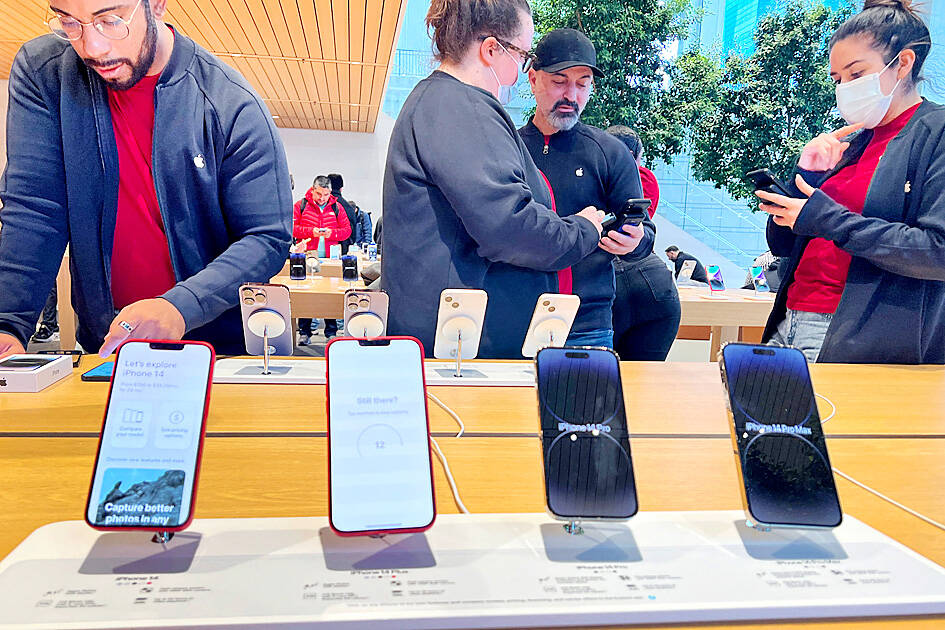Apple Inc exported more than US$2.5 billion of iPhones from India from April to last month, nearly twice the previous fiscal year’s total, underscoring how the US tech giant is accelerating a shift from China with geopolitical tensions on the rise.
Foxconn Technology Group (富士康科技集團), known as Hon Hai Precision Industry Co (鴻海精密) in Taiwan, and Wistron Corp (緯創) had each shipped more than US$1 billion of Apple’s marquee devices abroad in the first nine months of the fiscal year ending in March, people familiar with the matter said.
Pegatron Corp (和碩), another major contract manufacturer for Apple, is on track to move about US$500 million of the gadgets overseas by the end of this month, the people said.

Photo: AFP
Apple’s rapidly growing export numbers illustrate how it is ramping up operations outside of China, where chaos at Foxconn’s main plant in Zhengzhou exposed vulnerabilities in the Cupertino, California-headquartered company’s supply chain and forced it to trim output estimates.
That compounded a broader problem with evaporating demand for electronics as consumers weigh the risks of a global recession.
Apple, the world’s most valuable company, began assembling its latest iPhone models in India only last year, a significant break from its practice of reserving much of that for giant Chinese factories run by its main Taiwanese assemblers including Foxconn.
While India makes up just a fraction of iPhone output, rising exports bode well for Indian Prime Minister Narendra Modi’s plan to make the nation an alternative to China as factory to the world.
Foxconn, Apple’s largest supplier, began building facilities in India more than five years ago in anticipation of a need to extend its geographic range.
One selling point is a raft of new government incentives, a cornerstone of Modi’s drive to make India an electronics manufacturing hub. Foxconn has won 3.6 billion rupees (US$43.7 million) of benefits in the first year of the so-called production-linked incentives scheme, while Wistron’s claims are being processed, the people said.
Apple’s contract manufacturers make iPhones at plants in southern India, but production in the nation is just beginning. About 3 million of the devices were made in India in 2021, compared with 230 million in China, according to Bloomberg Intelligence estimates.
Foxconn began making the iPhone 14 in India a few months ago — sooner than anticipated — after a surprisingly smooth production rollout that slashed the lag between Chinese and Indian output from months to weeks.
Apple’s three Taiwanese partners assemble iPhones 11 to 14 in India, but moving out of China, where Apple has built a deep supply chain for close to two decades, is not easy. A Bloomberg Intelligence analysis estimated it would take about eight years to move just 10 percent of Apple’s production capacity out of China, where about 98 percent of the company’s iPhones are being made.
India tracks production and exports of all smartphone makers who enjoy financial incentives.
Beyond smartphones, the nation is drawing up plans to boost financial incentives for tablet and laptop makers, hoping to woo Apple to make everything from earphones to MacBooks locally.

MULTIFACETED: A task force has analyzed possible scenarios and created responses to assist domestic industries in dealing with US tariffs, the economics minister said The Executive Yuan is tomorrow to announce countermeasures to US President Donald Trump’s planned reciprocal tariffs, although the details of the plan would not be made public until Monday next week, Minister of Economic Affairs J.W. Kuo (郭智輝) said yesterday. The Cabinet established an economic and trade task force in November last year to deal with US trade and tariff related issues, Kuo told reporters outside the legislature in Taipei. The task force has been analyzing and evaluating all kinds of scenarios to identify suitable responses and determine how best to assist domestic industries in managing the effects of Trump’s tariffs, he

TIGHT-LIPPED: UMC said it had no merger plans at the moment, after Nikkei Asia reported that the firm and GlobalFoundries were considering restarting merger talks United Microelectronics Corp (UMC, 聯電), the world’s No. 4 contract chipmaker, yesterday launched a new US$5 billion 12-inch chip factory in Singapore as part of its latest effort to diversify its manufacturing footprint amid growing geopolitical risks. The new factory, adjacent to UMC’s existing Singapore fab in the Pasir Res Wafer Fab Park, is scheduled to enter volume production next year, utilizing mature 22-nanometer and 28-nanometer process technologies, UMC said in a statement. The company plans to invest US$5 billion during the first phase of the new fab, which would have an installed capacity of 30,000 12-inch wafers per month, it said. The

Taiwan’s official purchasing managers’ index (PMI) last month rose 0.2 percentage points to 54.2, in a second consecutive month of expansion, thanks to front-loading demand intended to avoid potential US tariff hikes, the Chung-Hua Institution for Economic Research (CIER, 中華經濟研究院) said yesterday. While short-term demand appeared robust, uncertainties rose due to US President Donald Trump’s unpredictable trade policy, CIER president Lien Hsien-ming (連賢明) told a news conference in Taipei. Taiwan’s economy this year would be characterized by high-level fluctuations and the volatility would be wilder than most expect, Lien said Demand for electronics, particularly semiconductors, continues to benefit from US technology giants’ effort

‘SWASTICAR’: Tesla CEO Elon Musk’s close association with Donald Trump has prompted opponents to brand him a ‘Nazi’ and resulted in a dramatic drop in sales Demonstrators descended on Tesla Inc dealerships across the US, and in Europe and Canada on Saturday to protest company chief Elon Musk, who has amassed extraordinary power as a top adviser to US President Donald Trump. Waving signs with messages such as “Musk is stealing our money” and “Reclaim our country,” the protests largely took place peacefully following fiery episodes of vandalism on Tesla vehicles, dealerships and other facilities in recent weeks that US officials have denounced as terrorism. Hundreds rallied on Saturday outside the Tesla dealership in Manhattan. Some blasted Musk, the world’s richest man, while others demanded the shuttering of his